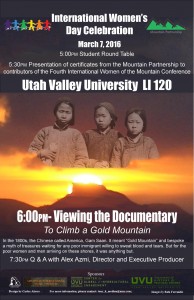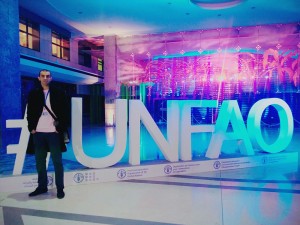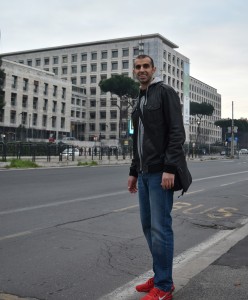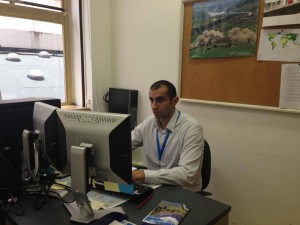***
***
***
On December 2, 2016, the Utah International Mountain Forum (UIMF), a coalition of student clubs at Utah Valley University (UVU) will celebrate International Mountain Day (IMD), established by the United Nations in 2003. UVU students will host the annual IMD celebration for the sixth time one week before December 11, which is the official date established by the UN for the IMD celebration, because of the coincidence of that date and the beginning of final examinations at the university. As a keynote presenter, they will host Ms. Mehak, director of the documentary “Daughter of Kalash,” as a follow up to the Women of the Mountains Conference (WOMC) under the umbrella of the UN Mountain Partnership (MP) held at UVU on October 7-9, 2015. WOMC was highlighted in the 2015 Annual Report of the MP as successfully hosted for the first time by students (, PP. 3, 13, 39). Ms. Mehak was not able to participate at the WOMC last year, therefore students raised funds to bring a foreign dignitary to Utah for the 2016 IMD commemoration.
The main theme for this year’s IMD is “Mountain Cultures: Celebrating Diversity and Strengthening Identity.”
***
Preliminary agenda of the 2016 IMD:
- Greetings from the Food and Agriculture Organization of the United Nations on the occasion of the IMD.
- Report about major initiatives and activities of UVU students during 2016 to advocate the sustainable mountain development (SMD) agenda of the United Nations in the State of Utah and North America, Tony Medina, President, UIMF.
- Presentation of Certificates for contribution to the SMD advocacy during 2016 to the faculty, students, and community representatives.
- Presentation of the ethnographic field work in Congo, “Mountains are not only geography, but also culture!” Jacques Baraketse, Sam Kabwika and Dr. Patience Kabamba, Utah Valley University.
- Keynote presentation of Ms. Mehak Asad, Assistant Director, GEO TV in Pakistan and director of the documentary film “Daughter of Kalash.” (https://vimeo.com/140086936) Asad will speak about her film and the issues facing the Kalash people.
In February of 2014, the New York Times published an article highlighting the unique lineage of the small and reclusive Kalash tribe. It would not be a surprise to many in their community if this is still the first time you have heard of them. As one of Pakistan’s smallest and most unique religious communities, they have faced centuries of hardships and possible extinction of their ways and customs. And while they have begun to rebound slightly, they still face many contemporary issues to maintain their unique way of life.
While their exact etymology is still somewhat of a mystery, a team of scientists, led by Simon Myers of Oxford University, have found a more recognized genome mixed into the Kalash people’s DNA. “Another mixing event is the injection of European-type DNA into the Kalash, a people of Pakistan, at some time between 990 and 210 B.C. This could reflect the invasion of India by Alexander the Great in 326 B.C. The Kalash claim to be descended from Alexander’s soldiers, as do several other groups in the region (Wade, Nicholas, “Tracing ancestry, researchers produce a genetic atlas of human mixing events,” The New York Times, (NY: NY, Feb. 13, 2014.).” With dwindling numbers and a rugged and remote area of the world they call home, it is no wonder they struggle to keep their beliefs and customs relevant to their youth.
Due their homeland’s placement on the map, they struggle continuously to fend off both Islamic extremists and governmental mandates. They have continuously been attacked by proselyting Muslim militants, the Afghani Taliban, and Pakistani mandates for conversion to Islam in the 1970s. Additionally, their polytheistic religious beliefs have fueled a rumor that they possess “immortality.” This has led to several attacks on their villages by the surrounding Muslim community.
With a generous count of just over 3,000 people who claim the Kalash faith, their religion is a blend of ancient Hindu, pre-Islamic Nuristan, and contain many of the Indo-Iranian myths, rituals, and aspects of their ancient society including dress, diet, and customs. To combat their dwindling numbers, their village will shun a Muslim convert to both deter others from converting to Islam, and keep their blood line “pure.” As one village leader put it, “If any Kalash converts to Islam, they cannot live among us anymore. We keep our identity strong (Raffaele, Paul, Smithsonian Jan. 2007).”
- Screening of the documentary.
- Q&A with Ms. Mehak Asad
- Reception
The event will be held in the Utah Valley University’s Library room LI 120 from 2 PM to 7 PM.
***
HOST OF THE 2016 IMD CELEBRATION
***
SPONSORS OF THE 2016 IMD CELEBRATION
For more information, please feel free to contact the president of the UIMF, Tony Medina, at .
Information on previous International Mountain Day celebrations can be found .
Tony Medina, President of UIMF and Deann Torsak, Executive Secretary of the 2015 Women of the Mountains Conference




















